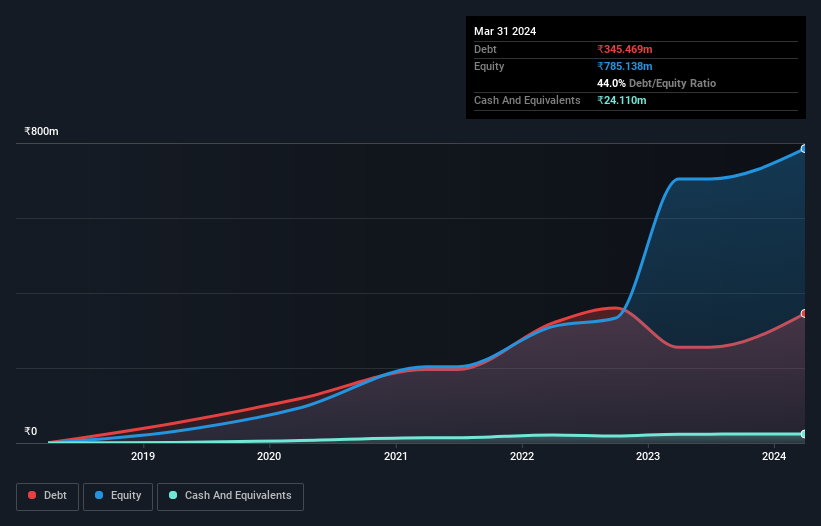- India
- /
- Healthcare Services
- /
- NSEI:QMSMEDI
We Think QMS Medical Allied Services (NSE:QMSMEDI) Can Stay On Top Of Its Debt

David Iben put it well when he said, 'Volatility is not a risk we care about. What we care about is avoiding the permanent loss of capital.' When we think about how risky a company is, we always like to look at its use of debt, since debt overload can lead to ruin. Importantly, QMS Medical Allied Services Limited (NSE:QMSMEDI) does carry debt. But the more important question is: how much risk is that debt creating?
What Risk Does Debt Bring?
Debt assists a business until the business has trouble paying it off, either with new capital or with free cash flow. In the worst case scenario, a company can go bankrupt if it cannot pay its creditors. However, a more frequent (but still costly) occurrence is where a company must issue shares at bargain-basement prices, permanently diluting shareholders, just to shore up its balance sheet. Having said that, the most common situation is where a company manages its debt reasonably well - and to its own advantage. The first thing to do when considering how much debt a business uses is to look at its cash and debt together.
View our latest analysis for QMS Medical Allied Services
How Much Debt Does QMS Medical Allied Services Carry?
You can click the graphic below for the historical numbers, but it shows that as of March 2024 QMS Medical Allied Services had ₹345.5m of debt, an increase on ₹255.2m, over one year. However, it does have ₹24.1m in cash offsetting this, leading to net debt of about ₹321.4m.

How Strong Is QMS Medical Allied Services' Balance Sheet?
According to the last reported balance sheet, QMS Medical Allied Services had liabilities of ₹539.7m due within 12 months, and liabilities of ₹28.4m due beyond 12 months. On the other hand, it had cash of ₹24.1m and ₹453.3m worth of receivables due within a year. So its liabilities total ₹90.7m more than the combination of its cash and short-term receivables.
Of course, QMS Medical Allied Services has a market capitalization of ₹1.94b, so these liabilities are probably manageable. But there are sufficient liabilities that we would certainly recommend shareholders continue to monitor the balance sheet, going forward.
In order to size up a company's debt relative to its earnings, we calculate its net debt divided by its earnings before interest, tax, depreciation, and amortization (EBITDA) and its earnings before interest and tax (EBIT) divided by its interest expense (its interest cover). Thus we consider debt relative to earnings both with and without depreciation and amortization expenses.
QMS Medical Allied Services has net debt worth 1.8 times EBITDA, which isn't too much, but its interest cover looks a bit on the low side, with EBIT at only 4.8 times the interest expense. While that doesn't worry us too much, it does suggest the interest payments are somewhat of a burden. Importantly, QMS Medical Allied Services grew its EBIT by 45% over the last twelve months, and that growth will make it easier to handle its debt. There's no doubt that we learn most about debt from the balance sheet. But you can't view debt in total isolation; since QMS Medical Allied Services will need earnings to service that debt. So if you're keen to discover more about its earnings, it might be worth checking out this graph of its long term earnings trend.
But our final consideration is also important, because a company cannot pay debt with paper profits; it needs cold hard cash. So we clearly need to look at whether that EBIT is leading to corresponding free cash flow. During the last three years, QMS Medical Allied Services burned a lot of cash. While investors are no doubt expecting a reversal of that situation in due course, it clearly does mean its use of debt is more risky.
Our View
QMS Medical Allied Services's conversion of EBIT to free cash flow was a real negative on this analysis, although the other factors we considered were considerably better. There's no doubt that its ability to to grow its EBIT is pretty flash. It's also worth noting that QMS Medical Allied Services is in the Healthcare industry, which is often considered to be quite defensive. Considering this range of data points, we think QMS Medical Allied Services is in a good position to manage its debt levels. But a word of caution: we think debt levels are high enough to justify ongoing monitoring. When analysing debt levels, the balance sheet is the obvious place to start. However, not all investment risk resides within the balance sheet - far from it. For instance, we've identified 3 warning signs for QMS Medical Allied Services (1 is a bit concerning) you should be aware of.
At the end of the day, it's often better to focus on companies that are free from net debt. You can access our special list of such companies (all with a track record of profit growth). It's free.
Valuation is complex, but we're here to simplify it.
Discover if QMS Medical Allied Services might be undervalued or overvalued with our detailed analysis, featuring fair value estimates, potential risks, dividends, insider trades, and its financial condition.
Access Free AnalysisHave feedback on this article? Concerned about the content? Get in touch with us directly. Alternatively, email editorial-team (at) simplywallst.com.
This article by Simply Wall St is general in nature. We provide commentary based on historical data and analyst forecasts only using an unbiased methodology and our articles are not intended to be financial advice. It does not constitute a recommendation to buy or sell any stock, and does not take account of your objectives, or your financial situation. We aim to bring you long-term focused analysis driven by fundamental data. Note that our analysis may not factor in the latest price-sensitive company announcements or qualitative material. Simply Wall St has no position in any stocks mentioned.
About NSEI:QMSMEDI
QMS Medical Allied Services
Distributes medical and healthcare devices in India.
Excellent balance sheet with acceptable track record.
Similar Companies
Market Insights
Community Narratives




